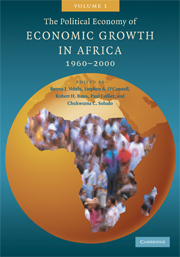12 - Harnessing growth opportunities: how Africa can advance
Published online by Cambridge University Press: 09 January 2010
Summary
Introduction
Our analysis has been retrospective: Africa's economic growth over the period 1960–2000. The primary purpose in understanding Africa's past is to help guide its future. Our main conclusion from our review of Africa's past has been that while its opportunities were atypically difficult, its politics evolved in such a way that it largely failed to harness them. The politics was transmitted into the economy through syndromes: growth-constraining packages of policies, institutions, and behavior.
In this chapter we look forward. Opportunities, as we define them, are geographical characteristics and hence, for better or for worse, there is little one can do to change them. Africa can, however, make much better use of its opportunities and, where opportunities are adverse, mitigate their economic impact. We consider in turn the three big opportunity groups that we have used throughout the study – landlocked and resource-scarce, resource-rich, and coastal and resource-scarce countries. For each we ask two types of question. First, what proximately is needed in order for opportunities to be harnessed? For example, landlocked Africa needs better transport infrastructure. Second, what are the political underpinnings that would enable such proximate changes to be made and sustained? For example, what political structures would provide the incentive for neighboring countries to maintain the transport corridors that landlocked countries need?
As background, we stress four major lessons from our analysis of Africa's experience.
- Type
- Chapter
- Information
- The Political Economy of Economic Growth in Africa, 1960–2000 , pp. 421 - 438Publisher: Cambridge University PressPrint publication year: 2007

